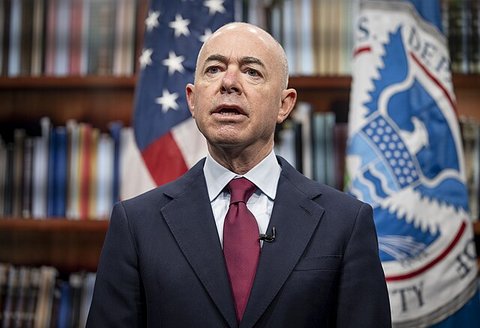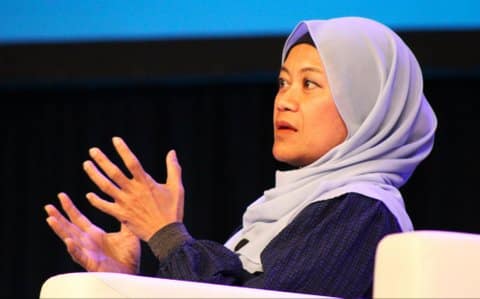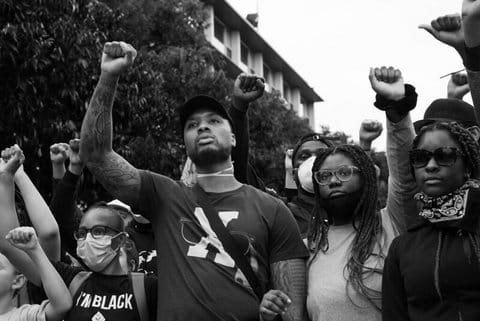
18 Jul Department of Homeland Security Combats and Contributes to Hate-Fueled Violence

Department of Homeland Security Secretary Alejandro Mayorkas was a keynote speaker at the 2023 Eradicate Hate Global Summit. (DHS)
Editor’s note: The Eradicate Hate Global Summit began in 2021 in response to the mass shooting at the Tree of Life synagogue. Last year, The CC Pulse was there for the first time in service of our Stop the Hate coverage.
By Joe Porrello
PITTSBURGH — The U.S. Department of Homeland Security has been accused of not only having an insufficient foundation for battling bigotry but also playing a role in hate-fueled violence itself in recent years.
However, DHS Secretary Alejandro N. Mayorkas said as a keynote speaker at the 2023 Eradicate Hate Global Summit that the department has implemented numerous strategies to reduce militant radicalization. These are not just intended for the general public but also for the department’s own ranks.
According to the Washington Post, senior DHS officials found in 2022 that the department had “significant gaps that have impeded its ability to comprehensively prevent, detect and respond to potential threats related to domestic violent extremism within DHS.”
The report found that the department had “no official definition of or guidance about what constitutes a violent extremist, no workforce training to identify and report extremist activity, and insufficient funding for the already existing DHS Insider Threat Program.”
Mayorkas was sent a letter last year by over 65 Democrats in Congress asking how bigotry would be reduced within the department. This followed a 2015 report by the Project on Government Oversight that surfaced in 2022 about 300 current or former DHS employees being members of the right-wing militia group the Oath Keepers, which took part in the Jan. 6, 2021, insurrection in the U.S. Capitol.
Additionally, the ACLU proposed 15 reforms to DHS, calling for a complete overhaul of the department after agents beat demonstrators, grabbed individuals and forced them into unmarked vans, and unlawfully arrested dozens during protests over the murder of George Floyd by police.
Mayorkas, who was born in Cuba and raised in the U.S., is the first Latino and first immigrant to lead DHS, the third-largest federal government agency. In 1998, he became the youngest United States attorney at the time he was appointed, and has dealt with issues in his career such as human trafficking, cybersecurity and natural disasters.
Recently, the department’s focus, he says, lies on domestic terrorism, much of which is rooted in hateful ideologies.
As someone who has seen the long-term effects of bigotry, Mayorkas noted the importance of fighting radicalization and his disagreement with the notion that time heals all wounds.
“There is no such thing as a small act of hate, and it is always felt more broadly than the victims themselves,” he said. “Hurt and fear ripple outwards after every such act. The waves may get smaller or farther apart, but they can still crash over us often and in unexpected ways.”
Both his parents are Jewish; his mother escaped the Holocaust, but many in her family did not. He said her trauma caused her to forbid him from sleeping away from home.
>>>Read: Holocaust Survivor’s Life Is an Open Book Come Alive<<<
“She had known of children who left home and did not return… it compelled her decades later to keep us close,” Mayorkas said.
Many more kids in recent years have left their homes without returning as a result of hate-fueled violence. Mayorkas noted offenders of today are not concerned with high-profile targets but instead convenient ones — like schools or houses of worship.
>>>Read: FBI Hate Crime Report says Juveniles Targeted at Schools<<<
According to the most recent annual U.S. Gun Violence report by the Johns Hopkins Center for Gun Violence Solutions, a record 48,830 people were shot to death in 2021; the previous record was 45,222 the year before.
Mayorkas said surging gun violence and hate group activity in 2022 prompted President Biden to establish the Office of Gun Violence Prevention and the National Strategy for Countering Domestic Terrorism.
“Our nation faces an evolved and expanded threat environment,” he said, and the work of DHS has “grown and proceeded alongside the threat environment.”
The department’s Targeted Violence and Terrorism Prevention Grant Program has helped about 150 violence reduction pilot programs get started, according to Mayorkas.
He also pointed to the agency’s Center for Prevention Programs and Partnerships, which connects state and local leaders with technical, educational and policy assistance.
>>>Read: State and Local Strategies Battling Bigotry Are Critical, Expert Says<<<
As DHS works with communities affected by hate, Mayorkas points to their resiliency.
“I know that for every enduring ripple of hurt and fear that follows an act of hate, there is also an enduring ripple of resolve, and indeed — to paraphrase Robert Kennedy — an enduring ripple of hope,” he said.
Mayorkas highlighted the importance of collaboration in curbing extremism.
“It’s only at the nexus of all these efforts that currents are built and tangible, life-saving progress is made for communities and for vulnerable populations across the country,” he said. “Partnership is fundamental to the security of our homeland, to our work combating domestic terrorism… to the mission of safety and security for all.”
Initiatives and communities trying to reduce extremism may make positive strides that provide inspiration and expectation, but Mayorkas noted the realistic big picture.
“There will be just as many, if not more days of disappointment and grief; days where your resolve will feel empty and hope will feel lost,” he said.
>>>Read: They Lost Loved Ones to Violent Bigotry. Now, They’re Working to Stop the Hate<<<
Mayorkas added that survivors are not alone in their frustration and that pride and peace can be restored through connections with each other.
“We must remember and abide by the principle that both guides us and binds us together: When one community is targeted for violence, we are all the victims,” he said.
Many of those victims of hate are migrants in the U.S.
According to the ACLU, the detention of immigrants — from an average of 19,000 average daily detainments in 2001 to 57,000 per day when Trump was in office — has grown in size alongside DHS.
The Biden administration’s planned budget for the agency in fiscal 2025 is $107.9 billion, including $62.2 billion in discretionary funding, according to a budget overview prepared by DHS. The Federal News Network says that includes increased funding for hundreds more staff at Customs and Border Protection.
This resource is supported in whole or in part by funding provided by the State of California, administered by the California State Library in partnership with the California Department of Social Services and the California Commission on Asian and Pacific Islander American Affairs as part of the Stop the Hate program. To report a hate incident or hate crime and get support, go to CA vs Hate.





No Comments